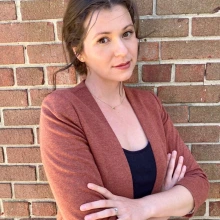2021 Dozier Award Recipients Announced
Congratulations to Jordan Wilson and A.G. Steig! Jordan’s paper “Negotiating Infant Personhood in Death: Interpreting atypical burials in the Late Roman Infant and Child Cemetery at Poggio Gramignano (Italy)” was selected as the 2021 School of Anthropology Dozier Award recipient. The award includes a $500 cash prize. A.G.’s paper “Ecology of the Possible: Climate Change and Forest Management” received second place and a $250 cash prize. Both awardees are encouraged to publicly present their work through the departmental lecture series. Jordan and A.G.’s photos appear with abstracts for their papers following this introduction of Dr. Dozier himself.
Professor Edward Dozier was and is special to the faculty and students of the SoA. He was a fine research anthropologist, a supportive teacher, and generally respected by all. Since 1973 we have celebrated his life and contribution to anthropology with the SoA Dozier award for the best graduate student paper. This is an appropriate award given his constant mentorship of students, especially those from other cultures. As one of the first indigenous anthropologists, Dozier conveyed through his research the value of both the Insider (emic) and the Outsider (etic) perspectives in anthropology.
Below is the UA Press overview of a book devoted to Dozier by Marilyn Norcini. It is a good read for young and established anthropologists: Edward P. Dozier: The Paradox of the American Indian Anthropologist (https://uapress.arizona.edu/book/edward-p-dozier).
Edward P. Dozier was the first American Indian to establish a career as an academic anthropologist. In doing so, he faced a double paradox—academic and cultural. The notion of objectivity that governed academic anthropology at the time dictated that researchers be impartial outsiders. Scientific knowledge was considered unbiased, impersonal, and public. In contrast, Dozier’s Pueblo Indian culture regarded knowledge as privileged, personal, and gendered. Ceremonial knowledge was protected by secrecy and was never intended to be made public, either within or outside of the community. As an indigenous ethnologist and linguist, Dozier negotiated a careful balance between the conflicting values of a social scientist and a Pueblo Indian. Based on archival research, ethnographic fieldwork at Santa Clara Pueblo, and extensive interviews, this intellectual biography traces Dozier’s education from a Bureau of Indian Affairs day school through the University of New Mexico on federal reimbursable loans and graduate school on the GI Bill. Dozier was the first graduate of the new post–World War II doctoral program in anthropology at the University of California at Los Angeles in 1952. Beginning with his multicultural and linguistic heritage, the book interprets pivotal moments in his career, including the impact of Pueblo kinship on his indigenous research at Tewa Village (Hano); his rising academic standing and Indian advocacy at Northwestern University; his achievement of full academic status after he conducted non-indigenous fieldwork with the Kalinga in the Philippines; and his leadership in establishing American Indian Studies at the University of Arizona. Norcini interprets Dozier’s career within the contexts of the history of American anthropology and Pueblo Indian culture. In the final analysis, Dozier is positioned as a transitional figure who helped transform the historical paradox of an American Indian anthropologist into the contemporary paradigm of indigenous scholarship in the academy.

Jordan A. Wilson, “Negotiating Infant Personhood in Death: Interpreting atypical burials in the Late Roman Infant and Child Cemetery at Poggio Gramignano (Italy)”
Abstract: The Late Antique (ca. 450 CE) infant and child cemetery uncovered at Poggio Gramignano near Lugnano in Teverina (Italy), the largest known Roman infant cemetery, has been interpreted as a catastrophic death assemblage associated with an acute epidemic of Plasmodium falciparum malaria and a resulting episode of increased infant and child mortality. This paper considers eleven newly uncovered burials of infants and children, ranging in age from six gestational months to ten years. Their associated atypical mortuary treatment suggests not only fear of the dead but mourning of very young individuals with ambiguous personhood. Because of the limited social status of infants and, especially, fetuses, the treatment of these individuals in death provides valuable and specific insight into the attitudes of this ancient rural community. This paper makes use of the archaeothanatological method to separate post-depositional taphonomic change from the social and ritual dimensions of intentional funerary behavior, a critical distinction when interpreting atypical (or “deviant”) burials such as those present in the infant cemetery. This analysis provides insight into a rural community’s shared stress surrounding sickness, child loss, and spirituality in a time of significant cultural and social transition.

A.G. Steig, “Ecology of the Possible: Climate Change and Forest Management”
Abstract: Policymakers are increasingly incorporating concerns about climate change into management of natural resources. In the forestry industry of western North America, climate-linked wildfires and beetle outbreaks have harmed ecologically and commercially valuable trees. Further, scientists project that trees that are planted in suitable areas today will be maladapted for these locations as their climate changes in the future. I investigate how foresters and scientists in British Columbia make use of large-scale industrial logging for ecological purposes. One practice is called “assisted migration”: in anticipation of a changing climate, seeds are transported to be planted in logged areas where the growing trees are expected to be better adapted in the future. I argue, first, that climate and forest sciences enable managers to project for futures and cope with uncertainties. Second, the existing conventions of industrial forest management shape the range of actions that are taken to prepare for ecological change.
Anthro News Digest date: 04/23/2021

